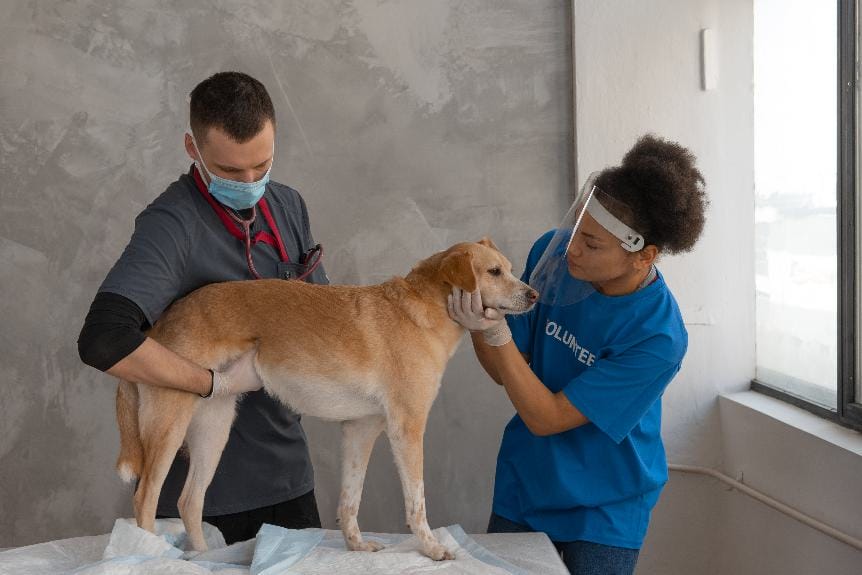Are Humidifiers Bad for Dogs? Understanding Pet Health
Imagine your dog, curled up on their bed, breathing in the gentle mist from a nearby humidifier, seemingly at peace in the cozy atmosphere you’ve created.
While it’s true that humidifiers can offer numerous health benefits for your furry friends, such as easing dry skin and improving their breathing conditions, it’s not as straightforward as plugging in a device and walking away. You’ve got to navigate through the maze of options, understanding that not all humidifiers are created equal, and some can pose potential risks that could outweigh the benefits.
Warm mist humidifiers, for instance, can be a hazard if your curious pooch gets too close. Moreover, without regular maintenance, these devices can become breeding grounds for bacteria and mold, potentially harming your pet’s health rather than enhancing it.
As you contemplate providing a more comfortable environment for your dog, it’s essential to weigh these factors carefully and understand how to safely incorporate a humidifier into your home. The key lies in selecting the right type, placing it strategically, and committing to a routine of cleanliness.
Let’s explore how you can achieve this balance and ensure your dog benefits from the humidifier without facing any unintended consequences.
Key Takeaways
- Different types of humidifiers have different benefits and risks for dogs, such as cool mist humidifiers being suitable for congestion relief and warm mist humidifiers posing a safety risk due to hot water.
- Humidifiers can improve dogs’ nasal passages, reduce skin irritation, alleviate stuffy noses, enhance overall quality of life, and reduce snoring.
- It is important to be aware of potential risks and hazards, such as burns from warm mist humidifiers, electrical problems from placing humidifiers near outlets, and the need to keep pets away from humidifiers.
- Maintenance and safety tips include keeping humidifiers out of reach of pets, avoiding the use of essential oils or additives, placing humidifiers away from electrical outlets, and regularly cleaning and using distilled water.
Types of Humidifiers
Understanding the different types of humidifiers can help you select the right one to maintain optimal humidity levels for your pet’s health and comfort.
Cool mist humidifiers are a common type, suitable for warm environments and providing congestion relief. It’s crucial, though, to keep them away from electrical outlets and out of pets’ reach.
Warm mist humidifiers create a cozy, warm vapor by heating water to a boil; however, they pose a high safety risk due to the hot water, necessitating caution around children and pets.
An ultrasonic humidifier, known for its quiet operation, uses a vibrating metallic diaphragm at an ultrasonic frequency to create water vapor. Despite their benefits, these humidifiers should be used with distilled water to prevent mineral buildup and kept away from electrical outlets.
Evaporative humidifiers absorb water through a wick filter, adding moisture to the air with a fan. They require regular cleaning and filter replacements to avoid bacterial growth.
Lastly, vaporizers, also known as steam or warm mist humidifiers, are portable and budget-friendly. They offer both heat and humidity, but due to the heat they generate, there’s an increased risk of burns, injuries, or fires, highlighting the importance of careful placement.
Health Benefits for Dogs
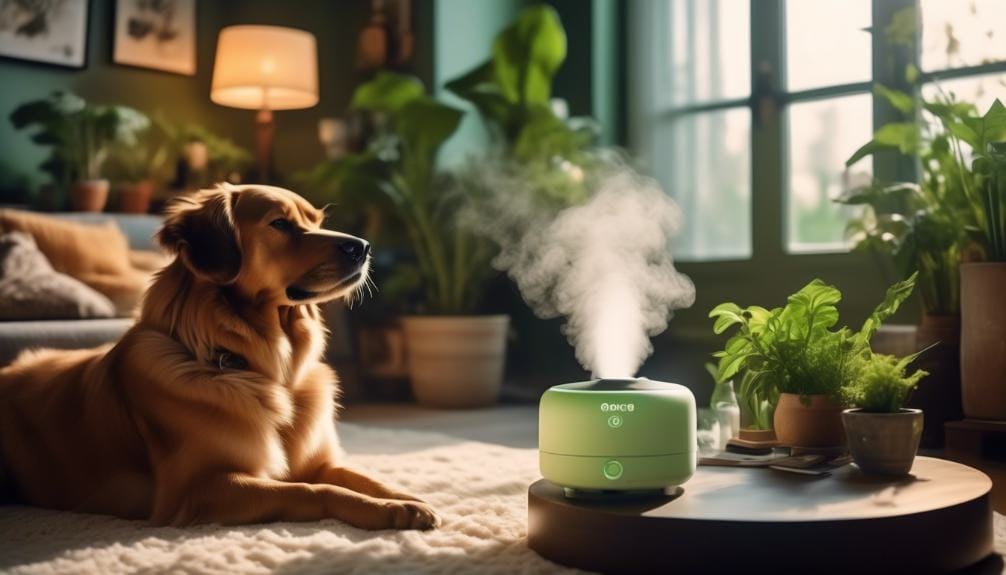
Using a humidifier can significantly enhance your dog’s health, particularly by improving their nasal passages and reducing skin irritation. When the air is dry, your dog might suffer from discomfort due to dry skin or difficulty in breathing. A humidifier adds moisture to the air, creating a more comfortable environment for your pet.
| Health Issue | Without Humidifier | With Humidifier |
|---|---|---|
| Nasal Passages | Dry, leading to discomfort | Moist, aiding easier breathing |
| Skin Irritation | Increased itchiness | Reduced dryness and itching |
| Comfort with Stuffy Nose | Minimal, leading to restlessness | Improved, promoting better rest |
| Overall Quality of Life | Compromised by discomfort | Enhanced by alleviating issues |
Humidifiers are safe for dogs when used properly and kept out of reach. The moisture level helps open their nasal passages, which not only helps your dog breathe easier but also reduces snoring by moisturizing their nasal tissues. Moreover, a humidifier would greatly benefit dogs suffering from dry and itchy skin by providing the necessary relief. Ensuring humidifiers are safe and used correctly, incorporating a humidifier into your dog’s environment is both safe and beneficial, significantly improving their quality of life.
Potential Risks and Hazards
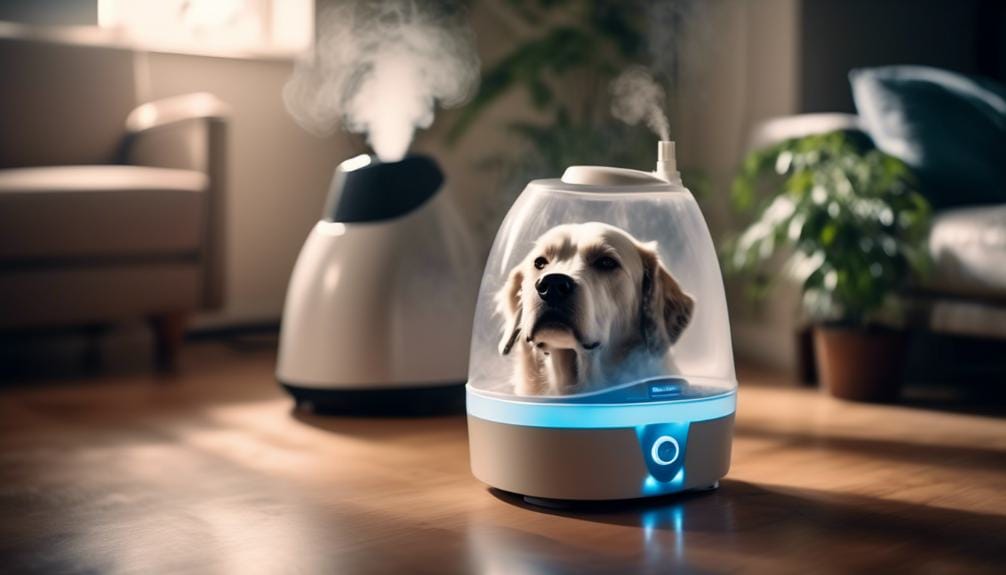
While humidifiers offer significant health benefits to your dog as previously discussed, it’s essential to be aware of potential risks and hazards associated with their use.
Warm mist humidifiers, in particular, pose an increased safety risk due to boiling water. It’s crucial to keep these devices out of your pet’s reach. The boiling hot water inside can cause burns if the humidifier is knocked over, so exercising caution is advised.
Additionally, placing humidifiers near electrical outlets can lead to electrical problems, which presents a risk not just to your dog, but to your home’s safety as well. By keeping humidifiers at a safe distance from outlets, you can help minimize the risk of accidents.
Maintenance and Safety Tips
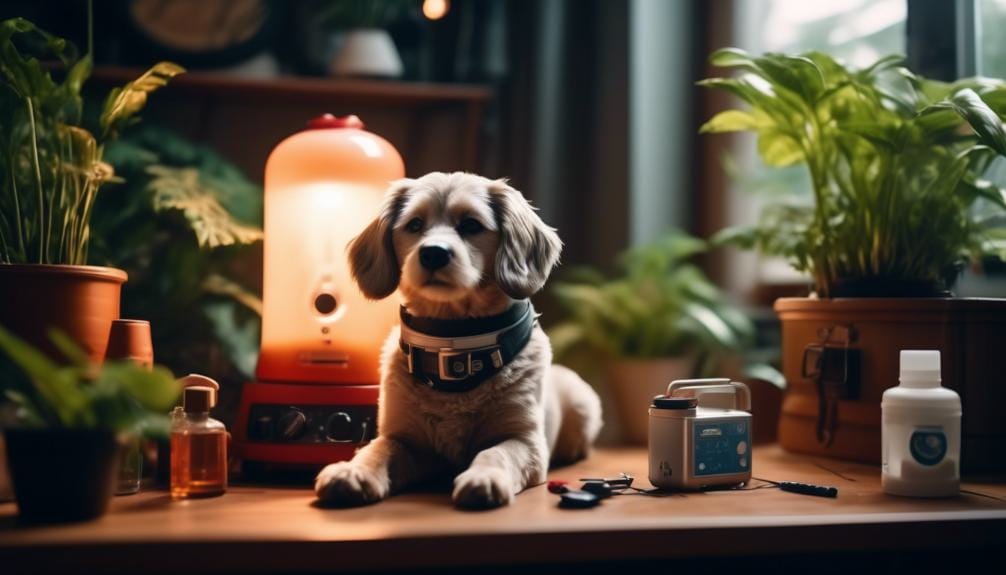
To ensure your pet’s safety and the optimal functioning of your humidifier, it’s crucial to adhere to certain maintenance and safety guidelines.
Firstly, keep your humidifier out of reach, especially warm mist models, to prevent accidental burns or injuries to your pets. It’s important to keep in mind that their curiosity could pose a health risk if they come too close.
Observe your pets closely during the initial use of the humidifier to ensure they don’t exhibit signs of discomfort or fear. This precaution helps you gauge whether the device is safe for dogs, depending on their reaction.
Additionally, avoid using essential oils or other additives in your humidifier, as these can irritate your pet’s respiratory system.
Select a sturdy humidifier and place it away from any electrical outlet to prevent potential accidents or damage and to prevent any electrical problems.
Moreover, using distilled water in your humidifier is essential to keep it clean and prevent bacteria from affecting both the air quality and your pet’s health.
Regular maintenance, including keeping the humidifier clean, is key to ensuring it doesn’t become a source of harmful bacteria or minerals that could compromise your pet’s well-being.
Alternative Humidity Solutions
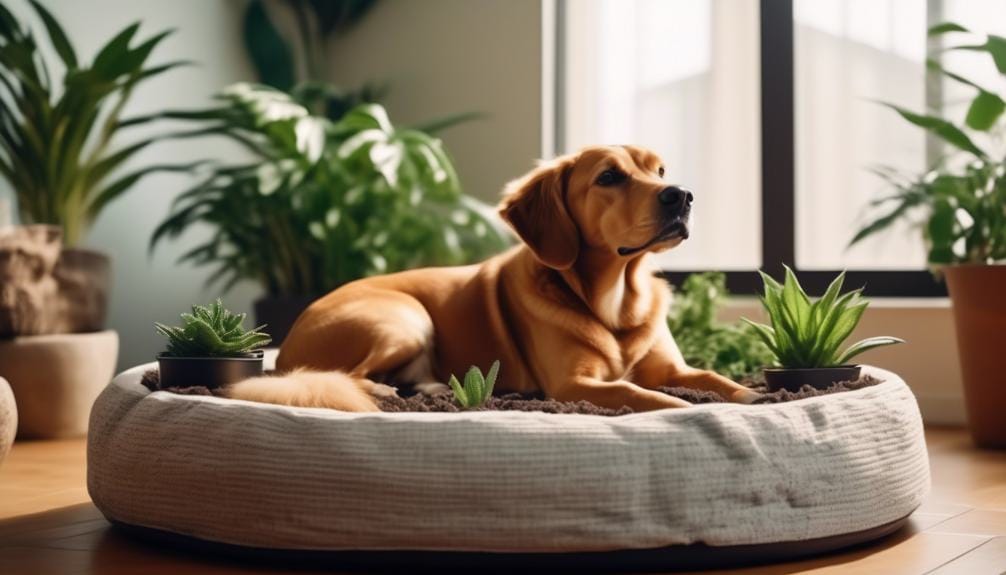
Frequently, pet owners seek alternative humidity solutions that are both safe and effective for maintaining a comfortable environment for their pets without relying on traditional humidifiers. Understanding the need to keep humidity levels in check while minimizing risks, it’s crucial to explore options that ensure your dog’s safety and comfort.
| Method | Benefit for Pets |
|---|---|
| Boiling water on the stove | Increases mist, safe when monitored |
| Non-toxic houseplants | Natural humidity, reduces Risk |
| Leaving bathroom doors open during showering | Warm, moist air without using a humidifier |
These alternative solutions not only prevent the dry air that can irritate your dog’s skin and respiratory system but also offer a warm and inviting environment without the potential hazards associated with humidifiers. Ensuring that these methods are implemented in a pet-safe manner is key. For instance, when boiling water, make sure it’s out of reach of curious paws to prevent accidents. Similarly, choosing houseplants that are non-toxic to dogs can enhance air quality without posing a health risk. By adopting these alternative humidity solutions, you can maintain optimal humidity levels for your pets, ensuring their comfort and well-being.
Frequently Asked Questions
Do Humidifiers Mess With Dogs?
You’re wondering if humidifiers affect dogs. They’re not inherently bad, but you’ve got to use them wisely. Keep them out of paw’s reach, avoid essential oils, and always consult your vet for specific health concerns.
Is a Humidifier Good for a Dog With Congestive Heart Failure?
Yes, a humidifier can be good for a dog with congestive heart failure. It improves air quality and relieves nasal and skin issues. However, you should consult a vet and keep it clean and out of reach.
Is a Warm or Cool Humidifier Better for Dogs?
You’re wondering if a warm or cool humidifier is better for dogs. Cool mist humidifiers are safer, reducing the risk of burns. They help with congestion and are great for your dog’s health in warm environments.
Can a Dog Be in the Same Room as a Vicks Humidifier?
You shouldn’t let your dog be in the same room as a Vicks humidifier. The menthol and other substances in it can be harmful to pets. Always choose pet-safe options to keep them healthy.
Conclusion
In summary, humidifiers aren’t inherently bad for your dog; in fact, they can be quite beneficial. By choosing the right type, like cool-mist over warm-mist, and adhering to safety measures, you’ll minimize risks.
It’s crucial to keep the device out of your pet’s reach and maintain regular cleaning to prevent bacteria buildup. If you’re vigilant about maintenance and safety, a humidifier can significantly improve your dog’s comfort and health by alleviating dry skin and enhancing air quality.

